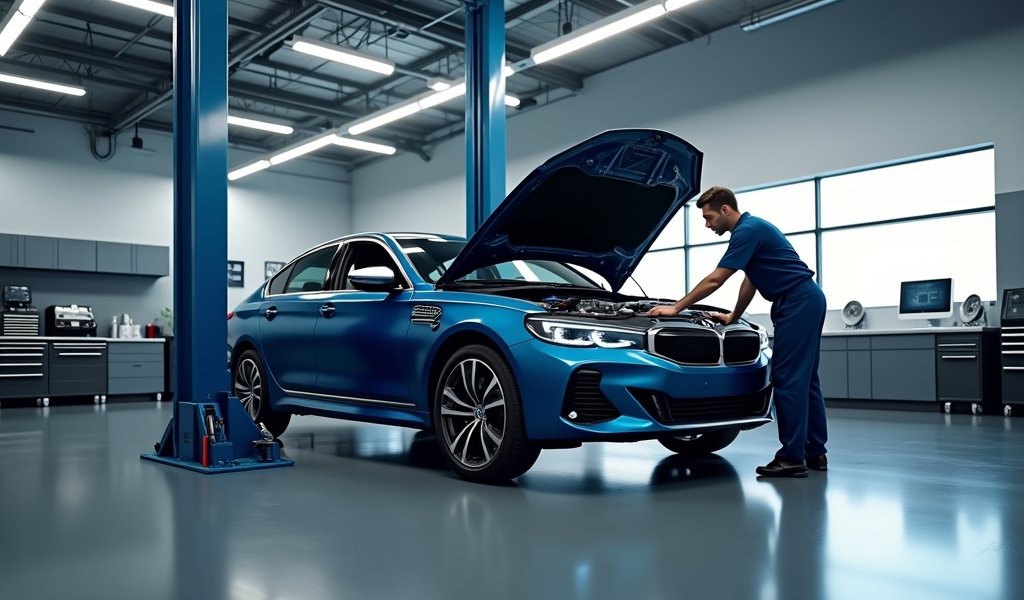Overview
The article outlines seven critical car maintenance practices that extend vehicle lifespan and save money: regular oil changes, proper tire care, monitoring fluid levels, brake inspections, battery maintenance, filter replacements, and professional inspections. Consistent preventive maintenance can double a vehicle’s useful life to 200,000-300,000 miles while saving thousands in repair costs, with mobile service options making professional care more convenient than traditional repair shops.
Table of Contents
- Understanding Car Maintenance: Why It Really Matters
- Tip 1: Never Skip Regular Oil Changes
- Tip 2: Proper Tire Care and Rotation
- Tip 3: Keep an Eye on Fluid Levels
- Tip 4: Don’t Ignore Your Brakes
- Tip 5: Battery Maintenance and Testing
- Tip 6: Regular Filter Replacements
- Tip 7: Schedule Professional Inspections
- How Our Mobile Services Make Maintenance Easy
- Conclusion
- Frequently Asked Questions
Understanding Car Maintenance: Why It Really Matters
The importance of car maintenance can’t be overstated—it’s the difference between a vehicle that lasts for decades and one that breaks down after a few years. After 20+ years working as a mechanic, I’ve seen countless cars roll into my shop with serious issues that could have been prevented with simple, regular maintenance. Your vehicle is a complex machine with hundreds of moving parts working together, and each component needs proper care to function optimally.
Think of maintenance as preventive medicine for your car. Just like you wouldn’t skip doctor check-ups to catch health issues early, your vehicle needs regular attention to prevent minor issues from becoming major (and expensive) problems. A well-maintained vehicle doesn’t just last longer—it runs more efficiently, saving you money on fuel, preventing unexpected breakdowns, and keeping you safe on the road.
Beyond the immediate benefits, regular vehicle maintenance also preserves your car’s resale value. When it’s time to sell or trade in, a comprehensive maintenance history can add hundreds or even thousands of dollars to your car’s value. Let’s dive into the seven most crucial maintenance practices that will extend your vehicle’s life and save you money in the long run.
Tip 1: Never Skip Regular Oil Changes

If there’s one maintenance item you should never neglect, it’s regular oil changes. Engine oil is the lifeblood of your vehicle—it lubricates moving parts, prevents friction, and carries away heat and contaminants. Over time, oil breaks down and becomes less effective, potentially causing serious engine damage if not replaced.
Most modern vehicles with synthetic oil can go between 5,000 to 10,000 miles between changes, but this varies based on your driving conditions and vehicle. If you do a lot of stop-and-go driving, tow heavy loads, or drive in extreme temperatures, you’ll need more frequent changes. Check your owner’s manual for the manufacturer’s recommendation—they know your engine best.
Our mobile oil change service makes this essential maintenance effortless. We come to your home or office, saving you time waiting at repair shops. A 30-minute service can save you from a $5,000+ engine replacement down the road—that’s what I call a good investment! Plus, studies show that regular oil changes can improve fuel efficiency by up to 2%, saving you money with every mile.
Tip 2: Proper Tire Care and Rotation
Your tires are literally where the rubber meets the road, making them critical to both safety and performance. Proper tire maintenance includes regular rotation, balancing, alignment checks, and—most importantly—maintaining correct tire pressure. Underinflated tires wear unevenly, reduce fuel economy, and can even lead to dangerous blowouts at highway speeds.
Tire rotation (switching their positions on your vehicle) ensures even wear and extends tire life by thousands of miles. Most manufacturers recommend rotating tires every 5,000-8,000 miles. While checking pressure, take a moment to inspect the tread depth—if you can see the top of Lincoln’s head when inserting a penny into the tread groove with his head upside down, it’s time for new tires.
Weather changes significantly impact tire pressure, with pressure dropping about 1 PSI for every 10°F decrease in temperature. That’s why autumn is an especially important time to check your tires as temperatures begin to fall. Our mobile mechanics can handle all aspects of tire maintenance during a single visit, including our free car diagnostic to identify potential alignment issues before they cause premature tire wear.
Tip 3: Keep an Eye on Fluid Levels
Your car depends on several different fluids to operate properly, and checking them regularly is one of the simplest yet most effective car maintenance tips I can offer. Beyond engine oil, your vehicle relies on transmission fluid, brake fluid, power steering fluid, coolant, and windshield washer fluid—each serving a crucial function.
Low fluid levels can lead to component damage, reduced performance, or complete system failure. For instance, running low on coolant can cause engine overheating, while insufficient brake fluid can compromise your stopping power—a genuinely dangerous situation. Most fluids should be checked monthly, with the engine cool and the car parked on level ground.
Our fluid top-up services ensure all your vehicle’s fluids are at optimal levels. We don’t just add fluids—we inspect their condition, checking for contamination or discoloration that might indicate deeper issues. Dark transmission fluid, for example, often suggests internal wear that should be addressed before it leads to transmission failure, which can cost $3,000-$5,000 to repair.
Tip 4: Don’t Ignore Your Brakes
When it comes to safety systems, nothing is more fundamental than your brakes. They’re also one of the components I see most frequently neglected until they’re causing serious problems. Waiting until you hear squealing, grinding, or feel vibration when stopping means you’ve already gone too far and likely caused additional damage.
Regular brake inspections should include checking pad thickness, rotor condition, brake fluid levels, and testing for proper function. Most vehicles need brake service every 25,000-50,000 miles, though this varies widely based on driving habits. If you do a lot of city driving with frequent stops, you’ll wear through pads much faster than someone who primarily drives highways.
Warning signs that you need immediate brake attention include: squeaking or grinding noises, vibration when braking, the brake pedal feeling soft or spongy, longer stopping distances, or your car pulling to one side when braking. Our on-site mechanics can perform a comprehensive brake inspection and even handle most repairs right in your driveway, saving you time and ensuring this critical safety system is always functioning properly.
Tip 5: Battery Maintenance and Testing

Nothing ruins a morning faster than turning the key and hearing… nothing. Battery failures are among the most common roadside emergencies, yet they’re also among the most preventable with proper maintenance. The average car battery lasts 3-5 years, but extreme temperatures, short trips, and leaving electronics running can significantly shorten that lifespan.
Regular battery maintenance includes keeping terminals clean of corrosion, checking that connections are tight, and having the battery tested periodically to measure its remaining capacity. Many drivers don’t realize that a battery can lose up to 35% of its power when temperatures drop below freezing, which is why so many failures occur during the first cold snap of winter.
Our free car diagnostic service includes battery testing to help you avoid unexpected failures. We check not just the battery itself but also your charging system to ensure your alternator is properly recharging the battery while driving. According to Consumer Reports, proper battery maintenance can extend its life by up to 50%, saving you money and preventing the inconvenience of unexpected failures.
Tip 6: Regular Filter Replacements
Your vehicle uses several different filters to protect its systems, and replacing them at proper intervals is a simple yet effective way to prevent expensive problems. The four main filters to monitor are the oil filter, air filter, cabin air filter, and fuel filter.
The oil filter traps contaminants that could damage your engine and should be replaced with every oil change. Your engine air filter prevents dust and debris from entering the engine, and a clogged filter can reduce power and fuel economy by up to 10%. Most air filters need replacement every 15,000-30,000 miles, but dusty conditions may require more frequent changes.
The cabin air filter—often forgotten during routine maintenance—keeps the air you breathe inside your vehicle clean by filtering out pollen, dust, and pollutants. A clean cabin filter is especially important for passengers with allergies or respiratory issues. Our comprehensive car service checklist includes inspection and replacement of all filters as needed, and we bring factory-spec replacements directly to you, ensuring your vehicle’s systems remain protected against contaminants.
Tip 7: Schedule Professional Inspections
While there’s plenty you can do yourself to maintain your vehicle, nothing replaces the trained eye of a professional mechanic for thorough inspections. Even the most diligent DIY car owner might miss subtle signs of wear or developing problems that could lead to expensive repairs if left unaddressed.
Professional inspections should happen at least annually, and include systems that aren’t easily accessible or require specialized knowledge to assess properly. These include suspension components, exhaust systems, fuel systems, and computerized diagnostics that can identify issues before they trigger warning lights.
During comprehensive inspections, our mechanics check everything from belt condition to electrical systems. We’ve often caught developing issues that would have left customers stranded within weeks—from failing water pumps to deteriorating CV joints. Having these problems identified early typically saves our customers hundreds in repair costs and prevents the cascade of damage that can occur when one component fails and affects others.
How Our Mobile Services Make Maintenance Easy
We understand that one of the biggest barriers to proper car maintenance is simply finding the time to get it done. That’s why we’ve built our business around bringing professional automotive care directly to you. Our suite of mobile services eliminates the need to rearrange your schedule or sit in waiting rooms.
Our mobile oil change service brings factory-spec oil and filters to your location, whether that’s your home driveway, office parking lot, or even at your vacation rental. We handle everything from basic oil changes to synthetic blends for high-performance vehicles, all without you having to leave your home or office.
The on-site mechanic services we offer cover most routine maintenance needs and many repairs, with our fully-equipped mobile workshops bringing dealership-quality service to your location. From brake jobs to belt replacements, we can handle hundreds of different services without you having to visit a shop.
Our free car diagnostic service uses the same professional-grade equipment found in top repair facilities to accurately assess your vehicle’s health and identify any developing issues. And our fluid top-up services ensure all your vehicle’s critical fluids are at optimal levels, extending component life and ensuring proper system function.
Conclusion
The importance of car maintenance cannot be overstated when it comes to vehicle longevity, performance, and safety. By following these seven essential tips—regular oil changes, proper tire care, monitoring fluid levels, maintaining your brakes, testing your battery, replacing filters, and scheduling professional inspections—you’re making an investment that pays dividends in reliability, safety, and lower long-term costs.
Remember that consistency is key. Even the most expensive vehicle will deteriorate quickly without regular care, while even modest cars can run for hundreds of thousands of miles when properly maintained. Our mobile services make this care more convenient than ever, bringing professional expertise directly to you.
Don’t wait for warning lights or strange noises to address your vehicle’s needs. Preventive maintenance is always less expensive and less disruptive than reactive repairs. Your car takes care of you every day—return the favor with regular, thoughtful maintenance, and it will reward you with years of trouble-free service.
Frequently Asked Questions
How often should I really change my oil?
Most modern vehicles using synthetic oil can go 5,000-10,000 miles between changes. Check your owner’s manual for the manufacturer’s specific recommendation for your vehicle model.
What’s the most commonly neglected maintenance item?
Fluid checks and replacements are frequently overlooked, especially transmission fluid and brake fluid. These fluids degrade over time even if the vehicle isn’t driven much.
How much money can regular maintenance save in the long run?
Regular maintenance typically costs $500-$700 annually but can save $3,000-$5,000 per year in prevented major repairs. The average transmission replacement costs $4,500, while regular fluid changes cost under $200.
Can I really extend my car’s lifespan with proper maintenance?
Absolutely! Well-maintained vehicles commonly reach 200,000-300,000 miles, while neglected ones may develop serious issues before 100,000. Consistent maintenance can effectively double your vehicle’s useful life.
Is the manufacturer’s maintenance schedule too conservative?
Manufacturer schedules are designed for optimal performance and longevity, not to generate service revenue. Following these guidelines is the best way to maximize your vehicle’s lifespan and maintain warranty coverage.

